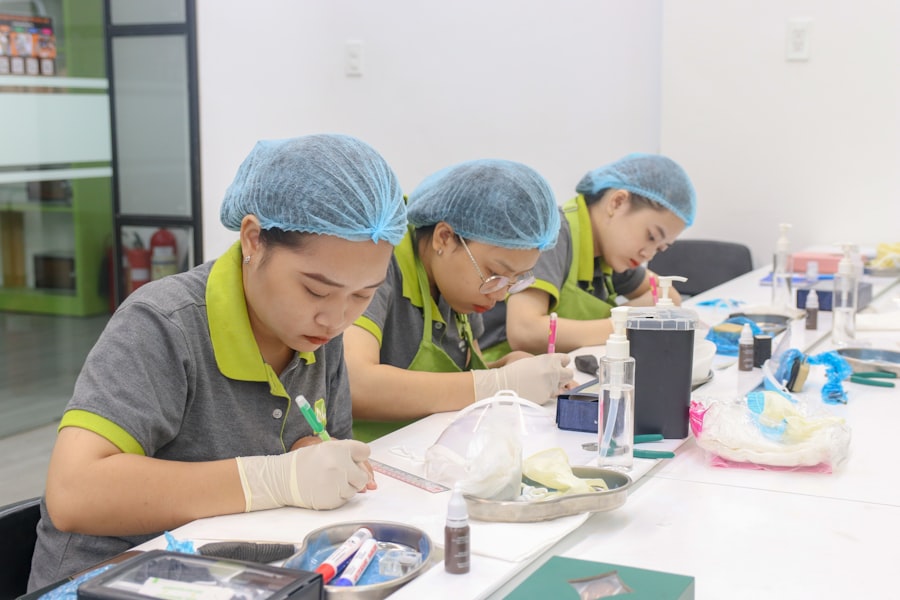In recent years, the landscape of employment has undergone a significant transformation, particularly with the advent of artificial intelligence (AI). As businesses increasingly integrate AI into their operations, the demand for skilled professionals who can test and validate these systems has surged. You may have noticed that AI testing jobs are not just a passing trend; they represent a fundamental shift in how technology is developed and maintained.
The rise of AI testing roles is a direct response to the complexities and challenges that come with deploying intelligent systems. Companies are now recognizing that robust testing is essential to ensure the reliability and effectiveness of AI applications. As you delve deeper into this field, you will find that AI testing jobs encompass a wide range of responsibilities, from evaluating algorithms to ensuring compliance with ethical standards.
The growth of this sector is fueled by the increasing reliance on AI in various industries, including healthcare, finance, and transportation. With the proliferation of machine learning models and neural networks, the need for specialized testing professionals has never been greater. You may find yourself at the forefront of this exciting evolution, contributing to the development of technologies that can change lives and reshape industries.
Key Takeaways
- AI testing jobs are on the rise as the demand for AI technology continues to grow.
- AI testing plays a crucial role in the development and advancement of technology, ensuring its reliability and performance.
- There are abundant opportunities for AI testing professionals in various industries, including healthcare, finance, and automotive.
- Skills and qualifications required for AI testing jobs include proficiency in programming languages, knowledge of AI algorithms, and experience in software testing.
- The challenges of AI testing include the complexity of AI systems, the need for large datasets, and the potential for bias in AI algorithms.
The Role of AI Testing in Technology Development
AI testing plays a crucial role in the technology development lifecycle. As you engage with this field, you will discover that testing is not merely an afterthought but an integral part of the development process. It ensures that AI systems function as intended and meet user expectations.
By rigorously testing these systems, you help identify potential flaws or biases that could lead to unintended consequences. This proactive approach is essential in building trust in AI technologies, which can often be perceived as opaque or unpredictable. Moreover, your involvement in AI testing can significantly influence the overall quality of technology products.
You will be tasked with assessing various aspects of AI systems, including performance, security, and usability. This multifaceted approach allows you to contribute to the creation of more reliable and user-friendly applications. As you collaborate with developers and data scientists, you will gain insights into the intricacies of AI algorithms and their real-world implications.
Your role will be pivotal in ensuring that these technologies not only function correctly but also align with ethical standards and societal values.
The Opportunities for AI Testing Professionals

The burgeoning field of AI testing presents a wealth of opportunities for professionals like you. As organizations continue to adopt AI solutions, they require skilled testers who can navigate the complexities of these systems. You may find job openings ranging from entry-level positions to senior roles that demand extensive experience and expertise.
The versatility of AI testing roles means that you can choose to specialize in various areas, such as automated testing, performance evaluation, or ethical compliance. Additionally, the global nature of the tech industry means that opportunities are not limited to your local market. You may have the chance to work with international teams or even remotely for companies based in different countries.
This flexibility can enhance your career prospects and allow you to gain diverse experiences. As you build your skills and reputation in AI testing, you may also find opportunities for advancement into leadership positions or specialized roles that focus on emerging technologies like natural language processing or computer vision.
The Skills and Qualifications Required for AI Testing Jobs
| Skills and Qualifications | Description |
|---|---|
| Programming Languages | Proficiency in languages such as Python, Java, or C++ |
| Machine Learning | Understanding of machine learning algorithms and techniques |
| Testing Tools | Experience with testing tools like Selenium, Appium, or JUnit |
| Data Analysis | Ability to analyze and interpret data for testing purposes |
| Problem-Solving Skills | Capability to identify and solve complex problems in AI systems |
| Communication Skills | Effective communication to collaborate with developers and stakeholders |
| Ethical Understanding | Awareness of ethical considerations in AI testing |
To thrive in the field of AI testing, you will need a unique blend of skills and qualifications. A strong foundation in computer science or software engineering is often essential, as it equips you with the technical knowledge necessary to understand complex algorithms and coding practices. Familiarity with programming languages such as Python or Java can be particularly beneficial, as these languages are commonly used in AI development.
Additionally, knowledge of machine learning concepts and frameworks will give you an edge in understanding how to effectively test these systems. Beyond technical skills, soft skills are equally important in AI testing roles. You will need to possess strong analytical abilities to identify issues within AI systems and propose effective solutions.
Communication skills are also vital, as you will often collaborate with developers, data scientists, and other stakeholders to ensure that testing processes align with project goals. Furthermore, a keen attention to detail will help you catch subtle errors that could have significant implications for system performance. As you pursue a career in AI testing, consider seeking out certifications or training programs that can bolster your qualifications and demonstrate your commitment to this evolving field.
The Challenges of AI Testing
While the opportunities in AI testing are abundant, it is essential to acknowledge the challenges that come with this profession. One significant hurdle is the inherent complexity of AI systems themselves. Unlike traditional software applications, AI models can behave unpredictably due to their reliance on vast datasets and intricate algorithms.
As an AI tester, you may encounter situations where it is difficult to replicate specific scenarios or understand why a model produces certain outputs. This unpredictability can complicate the testing process and necessitate innovative approaches to ensure thorough evaluation. Another challenge lies in addressing biases within AI systems.
This requires not only technical expertise but also a deep understanding of ethical considerations surrounding AI deployment. You may find yourself grappling with questions about fairness, accountability, and transparency as you strive to create equitable solutions.
Navigating these challenges will require resilience and adaptability, but overcoming them will ultimately contribute to your growth as a professional in this dynamic field.
The Importance of Ethical Considerations in AI Testing

Ethical considerations are paramount in the realm of AI testing. As you engage with this field, it is crucial to recognize that the technologies you help develop can have far-reaching implications for society. Ensuring that AI systems are fair, transparent, and accountable is not just a technical requirement; it is a moral obligation.
You will need to be aware of potential biases in training data and algorithms that could perpetuate discrimination or inequality. By prioritizing ethical considerations in your testing processes, you contribute to building trust in AI technologies. Moreover, your role as an AI tester extends beyond technical evaluation; it involves advocating for responsible practices within your organization.
You may find yourself collaborating with cross-functional teams to establish guidelines for ethical AI development and deployment. This could include creating frameworks for assessing bias or developing protocols for user privacy protection. By championing ethical considerations in your work, you position yourself as a leader in promoting responsible innovation within the tech industry.
The Future of AI Testing Jobs
As technology continues to evolve at a rapid pace, the future of AI testing jobs looks promising. You can expect to see an increasing demand for skilled professionals who can navigate the complexities of emerging technologies such as deep learning and reinforcement learning. As organizations strive to harness the full potential of AI, they will require dedicated testers who can ensure these systems operate effectively and ethically.
This trend suggests that job security in this field is likely to remain strong for years to come. Furthermore, advancements in automation and tools designed specifically for AI testing will likely reshape the landscape of this profession. You may find yourself utilizing sophisticated software solutions that streamline testing processes and enhance efficiency.
While automation may change certain aspects of your role, it will also create opportunities for you to focus on higher-level tasks that require critical thinking and creativity. Embracing these changes will be essential as you adapt to the evolving demands of the industry.
The Impact of AI Testing on Business and Industry
The impact of AI testing extends far beyond individual job roles; it significantly influences business operations and industry standards as well. By ensuring that AI systems function correctly and ethically, you contribute to enhancing overall productivity and efficiency within organizations. Companies that prioritize robust testing practices are more likely to achieve successful outcomes from their AI initiatives, leading to improved customer satisfaction and competitive advantage.
Moreover, your work in AI testing can help shape industry standards and best practices. As businesses increasingly rely on AI technologies, there is a growing need for consistent evaluation methods that ensure quality across different applications. By participating in discussions around industry benchmarks and guidelines, you can play a vital role in establishing norms that promote responsible AI development.
This collaborative effort can lead to greater accountability within the tech sector and foster public trust in emerging technologies.
The Training and Education Options for AI Testing Careers
To embark on a successful career in AI testing, it is essential to explore various training and education options available to you. Many universities now offer specialized programs focused on artificial intelligence and machine learning, providing a solid foundation for aspiring testers like yourself. These programs often include coursework on software development methodologies, data analysis techniques, and ethical considerations in technology.
In addition to formal education, online courses and certifications can enhance your skill set and make you more competitive in the job market. Platforms such as Coursera or edX offer courses specifically tailored to AI testing methodologies and tools.
By actively seeking out these opportunities for growth, you position yourself as a well-rounded candidate ready to tackle the challenges of this dynamic field.
The Diversity and Inclusion in AI Testing Jobs
Diversity and inclusion are critical components of any successful workforce, particularly in fields like AI testing where varied perspectives can lead to more innovative solutions. As you navigate your career path, it is important to advocate for inclusive practices within your organization and the broader tech community. Diverse teams bring together individuals from different backgrounds who can contribute unique insights into problem-solving processes.
Moreover, fostering diversity within AI testing roles can help mitigate biases present in algorithms and datasets. When teams reflect a wide range of experiences and viewpoints, they are better equipped to identify potential pitfalls in AI systems before they reach deployment stages. By championing diversity initiatives within your workplace or participating in organizations focused on promoting inclusion in tech, you can play an active role in shaping a more equitable future for the industry.
The Collaboration Between AI Testing Professionals and Developers
Collaboration between AI testing professionals and developers is essential for creating high-quality products that meet user needs effectively. As an AI tester, your ability to communicate clearly with developers will significantly impact the success of projects you work on together. Establishing strong working relationships fosters an environment where feedback flows freely, allowing both parties to address issues promptly.
You may find yourself participating in agile development processes where continuous integration and delivery are prioritized. In such environments, your collaboration with developers becomes even more critical as rapid iterations require constant testing and validation of new features or updates. By working closely with developers throughout the project lifecycle, you contribute not only to product quality but also to a culture of shared responsibility for delivering exceptional results.
In conclusion, as you explore the world of AI testing jobs, you’ll discover a dynamic field filled with opportunities for growth and impact. By honing your skills, embracing ethical considerations, advocating for diversity, and fostering collaboration with developers, you position yourself as a valuable asset in shaping the future of technology development.
In the rapidly evolving field of artificial intelligence, the demand for AI testing jobs is on the rise as companies strive to ensure the reliability and efficiency of their AI systems. A related article that delves into the intricacies of AI testing and its growing importance in the tech industry can be found on How Wealth Grows. This article provides valuable insights into the skills required for AI testing roles and the potential career paths available in this burgeoning field. For more information, you can read the full article by visiting How Wealth Grows.
FAQs
What are AI testing jobs?
AI testing jobs involve testing and evaluating artificial intelligence systems and algorithms to ensure they function as intended and meet quality standards.
What are the responsibilities of AI testing jobs?
Responsibilities of AI testing jobs may include designing and executing test cases, identifying and reporting bugs or issues, collaborating with developers and data scientists, and ensuring the accuracy and reliability of AI systems.
What skills are required for AI testing jobs?
Skills required for AI testing jobs may include knowledge of programming languages, understanding of machine learning algorithms, proficiency in testing tools and methodologies, critical thinking, problem-solving abilities, and strong communication skills.
What industries offer AI testing jobs?
AI testing jobs can be found in various industries such as technology, healthcare, finance, automotive, and manufacturing, where AI systems are being developed and implemented.
What is the job outlook for AI testing jobs?
The job outlook for AI testing jobs is promising, as the demand for AI technologies continues to grow across industries, creating a need for professionals to ensure the quality and reliability of these systems.
